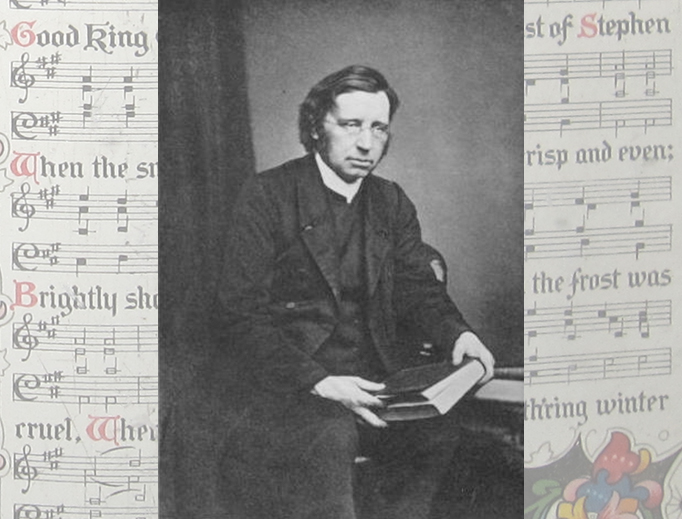Singing Christmas with the Fathers of the Church and John Mason Neale
Neale wrote the hymn version of “O Come, O Come Emmanuel” and the song “Good King Wenceslaus”

I subscribe to the monthly prayer magazine/missal, Magnificat. One of the first things I do when a new issue arrives is to look at the lists of hymns indexed in the back of the magazine. Several names often appear as author or translator and one of those names — especially around Christmas and Easter — is John Mason Neale.
Neale created the hymn version of the O Antiphons we sang during Advent, “O Come, O Come Emmanuel”. He wrote the song we often sing on the Feast of St. Stephen (December 26) — “Good King Wenceslaus” — and other hymns. As a translator, however, he brought us the poetry and hymns of the Fathers of the Church: Pope St. Gregory the Great, St. Ambrose, St. John of Damascus and others, especially the Fathers of the East. He also translated the works of the great Prudentius (“Corde natus ex parentis”/”Of the Father’s Love Begotten”) and Venantius Fortunatus (“Pange, lingua, gloriosi proelium certaminis”/“Sing my tongue the glorious battle” and “Vexilla regis prodeunt”/“The Royal banners forward go”). So Neale’s hymn translations are often a part of our liturgical celebrations of the Church year.
In Cambridge, Following Oxford
John Mason Neale was an Anglican who was influenced by the Oxford Movement while studying at Trinity College, University of Cambridge. He continued the work of Blessed John Henry Newman and the other Tractarians in bringing the Fathers of the Church back to influence the doctrine and liturgy of the Church of England. Neale not only translated the poetry of the Eastern Church, however, but also wrote about its history.
He continued his study of Church history and traditions into the Middle Ages, a place many Victorians were more willing to go after the influence of the Gothic Revival in architecture and the Pre-Raphaelite Brotherhood in poetry and paintings. Before that, the medieval era was called the Dark Ages because it was too Catholic. The beauty of the Gothic, revealed by the work of Augustus Pugin, and the romance of King Arthur’s court made the Middle Ages bright again.
John Mason Neale did not, however, follow Newman into the Catholic Church. Neale remained an Anglican and faced the great opposition of Church and State against his Anglo-Catholic, High Church ideas and projects.
Anglican Nuns!
In 1854, nine years after John Henry Newman had become a Catholic, Neale founded a religious order for Anglican women, the Society of Saint Margaret. The idea of a convent, even of active sisters, serving the sick and poor, was too much for some. Neale was attacked at a funeral for one of the sisters in Lewes and there was a riot, just three years after the order’s founding.
During his lifetime, Neale received no great honors from his church in spite of his good works and contributions to scholarship. Instead, he faced opposition and suspicion from his bishop because he was thought to be too “Roman” Catholic and perhaps even a secret Catholic working within the Church of England.
He was not alone: after his death, The Public Worship Regulation Act of 1874 was passed in Parliament—we must remember that the Church of England was and is a national state church and its liturgy and practices can be controlled by the government—outlawing the use of incense, lighted candles, genuflecting, mixed chalice (water added to the wine), ad orientem position at the altar (facing East), and wearing vestments. The Reverend Arthur Tooth was arrested on January 22, 1877. He was imprisoned for a month, left the country to recover his health, and returned to find himself locked out of his parish.
The Feast of the Transfiguration
John Mason Neale died on the Feast of the Transfiguration, August 6, 1866 when he was 48 years old. Note that he translated a poem by St. Cosmas the Melodist, “The choirs of ransomed Israel” for that Feast. He is now honored on the Church of England’s Calendar of Saints on August 7 as “Priest, Hymn writer”—although Anglicans do not canonize saints as we do. (They honor men and women whom the Church wants to offer as models.) His foundation, the Society of St. Margaret, is still active in England, Sri Lanka, and the United States. Neale’s motto for them is "Love first, love midst, love last".
In the midst of this Christmas season I love to hear his translation of Prudentius’ “Corde natus ex parentis”, set to the chant of Divinum mysterium, “ever more and ever more”.













